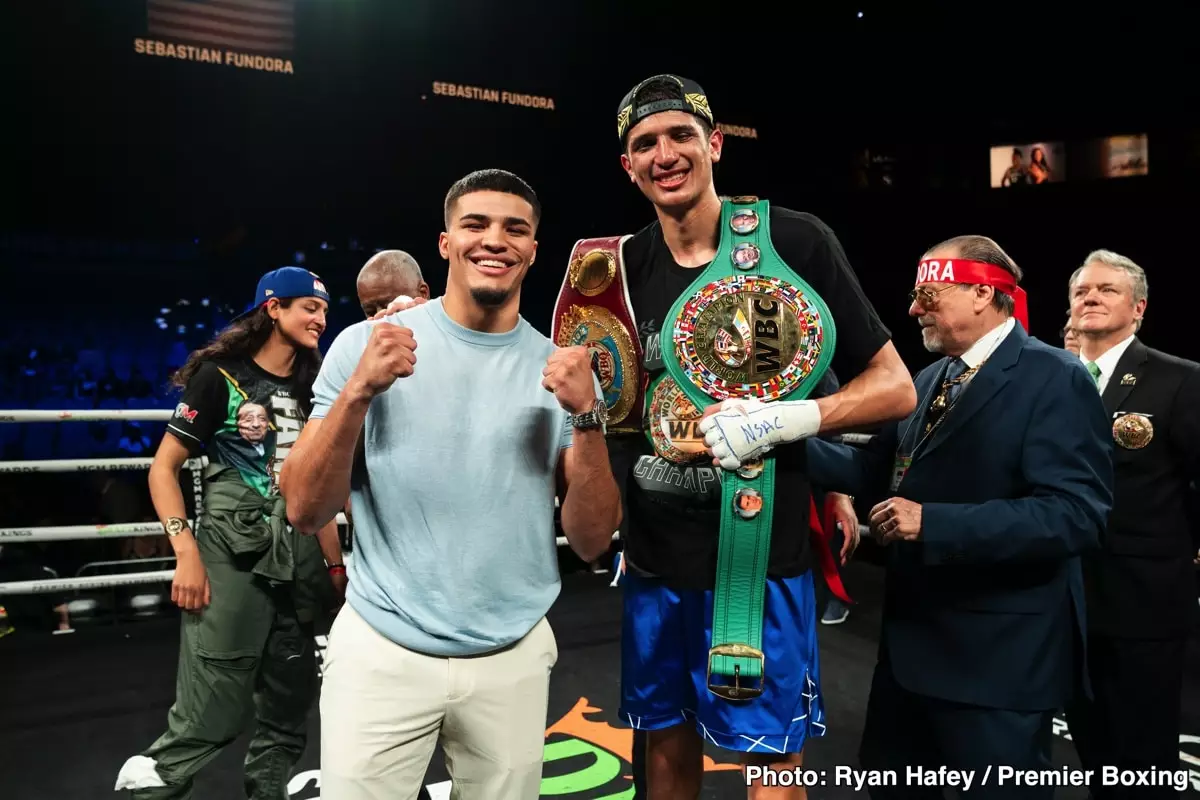In the world of boxing, ambition often collides headfirst with reality, and nowhere was this more apparent than during Xander Zayas’ recent attempt to spark a match-up with WBC and WBO junior middleweight champion Sebastian Fundora. Following Fundora’s spectacular fourth-round technical knockout victory over Chordale Booker, Zayas took matters into his own hands by confronting Fundora in his dressing room. This impulsive move, fueled by Zayas’ desire to establish himself as a serious contender, ultimately fell short, revealing the intricate dance of promotion, strategy, and timing in professional boxing.
Xander Zayas, a 22-year-old rising star, has shown potential that many commend; however, his recent actions raise questions about his tactical acumen. By rushing to initiate discussions for a scratch-his-back-and-I’ll-scratch-yours face-off with Fundora right after the latter’s victory, Zayas appeared overly eager. While enthusiasm is critical in boxing, Zayas’ approach seemed out of step with the heavyweight dynamics of the sport. Fundora and his promoter Sampson Lewkowicz, cognizant of their financial interests, did not reciprocate the enthusiasm, preferring to explore more lucrative opportunities instead.
The Financial Reality of Boxing
One of the overarching themes in this encounter is the financial calculus that underpins matchmaking in boxing. Fundora’s team considers Zayas not a substantial payday but rather a gamble with an uncertain outcome. In stark contrast to a seasoned fighter with a larger fanbase, Zayas’ marketability remains largely confined to hardcore boxing fans and the close-knit Puerto Rican community, which does not equate to formidable revenue. It is no secret that the boxing industry often prioritizes money-making bouts over competitive matchups, and in this instance, Zayas’ ambition to promote a fight before any agreement was reached detracted from his credibility.
The WBO has been vocal about Zayas’ status as the mandatory challenger, establishing a timeline for Fundora to defend his title. They stated that Fundora would have 120 days post-fight to face Zayas, but only if circumstances permit. Should Fundora evade this obligation for the chance of a more lucrative unification bout, Zayas risks being relegated to the sidelines. The boxing world doesn’t reward hopeful challengers eager for opportunity; rather, it validates those who command recognition and respect.
A Questionable Path to Mandatory Status
Zayas’ rise to the mandatory position has also sparked discussion regarding the legitimacy of title eliminators and the criteria for ascension in this hierarchical sport. His most recent victory over Slawa Spomer, a fighter without a notable track record, raises eyebrows about the transparency of the WBO’s selection process. The title eliminator felt more like a formality than a rigorous test of skill, wherein the WBO could have demanded that Zayas confront higher-ranked challengers like Charles Conwell instead.
However, Top Rank, Zayas’ promotional team, likely had no appetite for risks that could jeopardize their budding star’s ascent. This reluctance hints at a discomforting reality; often, the promotional machinery prioritizes both safety and marketability over the integrity of competition.
The Perils of Eagerness
Zayas’ declaration to the media following the pivotal confrontation underscores a naive determination. While he asserted himself with phrases like “I’m here to see the champion,” his rhetoric could be interpreted as misplaced confidence. The boxing landscape requires more than a youthful bravado; it necessitates strategic thinking, contemplation, and patience. By putting himself at Fundora’s doorstep unannounced, Zayas risked alienating potential allies and cementing his reputation as a mere contender rather than a strategic threat to the titleholder.
To grasp the full magnitude of Zayas’ situation, it’s crucial to acknowledge that in boxing, timing is everything. A more calculated approach might have served him better, allowing him to build anticipation and engage in more meaningful negotiations. As the sport’s landscape continues to evolve, so should the strategies of those who aspire to conquer it. In this high-stakes arena, a well-timed opportunity can lead to glory, while a hasty pursuit may instead lead to collapse. Thus, Zayas finds himself in a critical moment, one that will either redefine his career or lead to stagnation.

